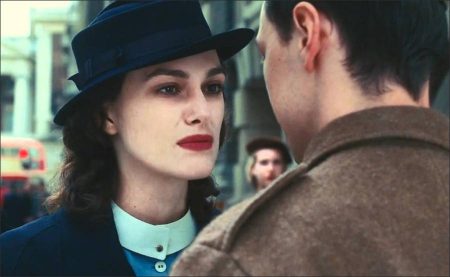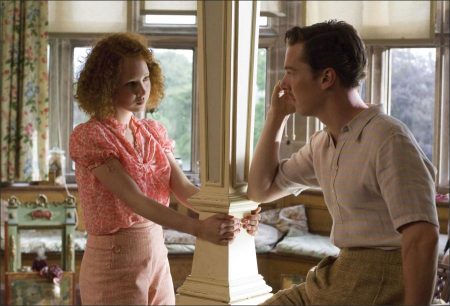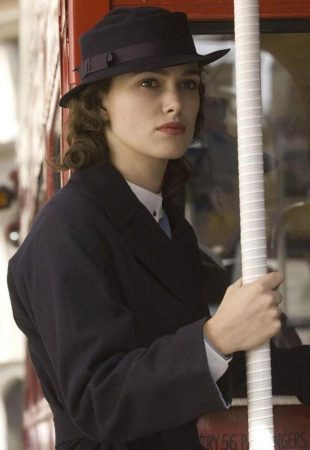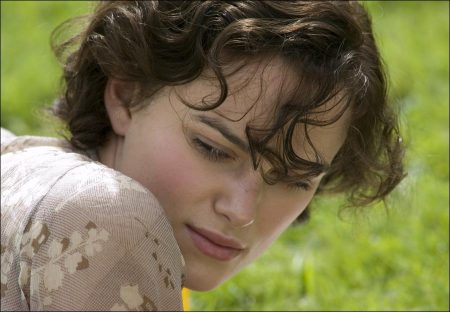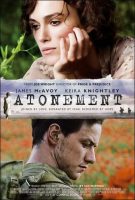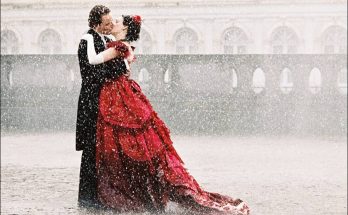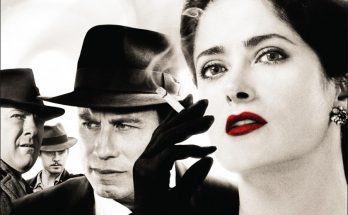Taglines: Joined by love. Separated by fear. Redeemed by hope.
On the hottest day of the summer of 1935, thirteen-year-old Briony Tallis sees her older sister Cecilia strip off her clothes and plunge into the fountain in the garden of their country house. Watching Cecilia is their housekeeper’s son Robbie Turner, a childhood friend who, along with Briony’s sister, has recently graduated from Cambridge. By the end of that day the lives of all three will have been changed forever. Robbie and Cecilia will have crossed a boundary they had never before dared to approach and will have become victims of the younger girl’s scheming imagination, and Briony will have committed a dreadful crime, the guilt for which will colour her entire life.
Atonement is a 2007 British romantic war drama film directed by Joe Wright and based on Ian McEwan’s 2001 novel of the same name. The film stars James McAvoy, Keira Knightley, Saoirse Ronan, Romola Garai and Vanessa Redgrave, and chronicles a crime and its consequences over the course of six decades, beginning in the 1930s. It was produced by Working Title Films and filmed in England. Distributed in most of the world by Universal Studios, it was released in the United Kingdom and Ireland on 7 September 2007 and in North America on 7 December 2007.
Atonement opened both the 2007 Vancouver International Film Festival and the 64th Venice International Film Festival, making Wright, at the age of 35, the youngest director ever to open the latter event. A commercial success, the film earned a worldwide gross of approximately $129 million against a budget of $30 million. Critics gave the drama positive reviews, praising its acting performances, its cinematography and Dario Marianelli’s score.
Atonement won an Oscar for Best Original Score at the 80th Academy Awards, and was nominated for six others, including Best Picture, Best Adapted Screenplay and Best Supporting Actress for Ronan. It also garnered fourteen nominations at the 61st British Academy Film Awards, winning both Best Film and Production Design, and won the Golden Globe Award for Best Motion Picture – Drama.
Adaptation
Even before Joe Wright had begun shooting his feature directorial debut, 2005’s Pride & Prejudice – which would ultimately earn him a BAFTA Award, among other honors – producer and Working Title Films co-chairman Tim Bevan realized, “We needed to plan on making this exceptional new director’s next movie. So we started to look for material that we might work on with Joe after Pride & Prejudice was finished.”
The new project would be another classic British romance from a great book; Ian McEwan’s award-winning best-selling novel Atonement was already in development at Working Title with producer Robert Fox and director Richard Eyre. But, as Bevan reports, “Richard took on another movie and had a stage commitment as well. Very honorably, because he absolutely loves Atonement, he said, that if we could find a director that we all agree we want to work with, then he would hand over the helm – and he did.”
The director was intent on bringing Atonement from page to screen. He knew that realizing the narrative would be an exciting filmmaking challenge. He comments, “In making a book into a movie, the story reveals itself to you as you make it. You are questioning the structure, you are questioning points of view – and, for Atonement, we were questioning one single truth as opposed to multiple truths.”
Academy Award-winning screenwriter Christopher Hampton had been adapting the novel. Wright explains, “When I was first sent the script, it had departed quite a lot from the novel. I thought the book was brilliant, and Christopher and I started again from scratch. The script was rewritten; we stuck to the book as faithfully as possible. “
“That was the approach that worked best,” confirms the screenwriter. “We returned to the structure of the book. The novel grows in power as the story progresses, and Joe and I wanted to stay true to that.”
“It was quite a fluid collaboration,” assesses Wright. “By the end, I felt I knew the book and knew the script totally, and understood every moment – or at least tried to. Then, I learned more and more about the material during shooting. A book is symbols and words on the pages; it happens in your head. As on Pride & Prejudice, I sought to make a film adaptation of the book that happened in my head as I read it. “
Paul Webster had already rejoined Working Title co-chairs Bevan and Eric Fellner as producer on Atonement, following their producing Pride & Prejudice together. Webster says, “I thought the book was Ian’s best, and most cinematic, work. Once our imaginative director started collaborating with Christopher, the script became richer and more complex. Joe brought a vast visual imagination to the film, and Christopher wrote a beautiful script – without what he calls the ‘convenient crutch’ of a voiceover.
“The themes Atonement addresses are so powerful and common to us all; emerging sexuality, intertwining fates, and that sense of ‘if only I’d have done this instead of that, my life would have been entirely different.’”
Bevan recalls discussing the difficulties of bringing Atonement to the screen. He notes, “The film was going to have to be all about the detail, about the times and about precision. It was going to need three different actresses to play the same role, and would use the device of multiple perspectives of the same event. It was going to be a very complicated piece.”
McEwan, who has witnessed his works being adapted for the screen on previous occasions, also knew the task would not be simple with Atonement. As he says, “It’s a kind of demolition job. You’ve got to boil down 130,000 words to a screenplay containing 20,000 words. In this particular case there are greater difficulties for the screenwriter because this is a very interior novel. It lives inside the consciousness of several characters. I think Christopher Hampton has steered a wise and clever course through the book.”
Hampton offers, “The best and most atmospheric of novelists are often the hardest to adapt. Yet, the adaptations that I’ve done that have given me the most satisfaction are from works – like Les Liaisons Dangereuses – that are masterpieces. I think Atonement is one of the best novels of the last 20 years, so to preserve its qualities was a great responsibility.”
Michiko Kakutani wrote in The New York Times [on June 1, 2007] that, in Atonement, the author “beautifully [explores] the precariousness of daily life and the difficulty of achieving – and holding onto – ordinary happiness.”
Wright muses, “Atonement, though set in the past, has contemporary relevance; it is about everyday experiences, relationships, emotions, choices, and decisions. As on Pride & Prejudice, I sought to interpret a period story in such a way that the modern-day audience is able to see beyond the time and setting of a story – and into the story itself.
“What I have learned from directing period pieces is that they free your imagination. If you utilize the specifics of a period very precisely in tandem with emotional truths, it all becomes relevant to a modern audience. In terms of the themes that Atonement deals with, it taught me a lot.”
Hampton adds, “The more accurate you are with presenting a period, the more striking the modern aspects of the story become. Audiences watching Atonement will see a completely different world than the one they know – and people in it relating to each other in wholly recognizable ways.”
Bevan concludes, “There is a fascinating emotional journey at the heart of Atonement. We all have to live through the circumstances of what we do at any point in our life, and this story is a very acute rendition of that.”
By the spring of 2006, the screenplay adaptation was at the 25,000 words it needed to be for a viable movie to be made.
Continue Reading and View the Theatrical Trailer
Atonement (2007)
Directed by: Joe Wright
Starring: Keira Knightley, James McAvoy, Romola Garai, Brenda Blethyn, Vanessa Redgrave, Anthony Minghella, Harriet Walter, Juno Temple, Felix von Simson, Patrick Kennedy, Peter Wight
Screenplay by: Christopher Hampton
Production Design by: Sarah Greenwood
Cinematography by: Seamus McGarvey
Film Editing by: Paul Tothill
Costume Design by: Jacqueline Durran
Music by: Dario Marianelli
MPAA Rating: R for disturbing war images, language and some sexuality.
Distributed by: Working Title Films, Focus Features
Release Date: December 7, 2007
Visits: 106

